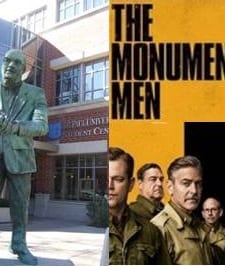
What does a mediocre rental movie have to do with existential questions of humanity and the value of higher education? Probably very little, but I will let you peek into the firing of my synapses which found a connection.
It was a free night with no plans so my wife and I rented a movie from the box in the drug store. After some discussion we choose The Monuments Men. The movie follows the ‘based on a true story’ tale of a group of art scholars tasked with preserving masterpieces during the throes of World War II. The mission is carried out while the Nazis are seeking to seize masterpieces from the countries being militarily conquered. Worse still, because of the war paintings, sculpture, and architecturally important buildings could be destroyed either due to the fighting and bombing or intentionally due to the Nazis’ desire to eradicate a people’s culture from the earth.
The movie focused on some key questions for us as people. How can we reconcile the spending of resources on preserving works of art (no matter how beautiful) with the fact that resources are in short supply and in high demand for other needs? How can we spend lives saving art rather than defeating the enemy? More importantly, what is it we are actually fighting for? What do we truly value?
These questions make me think of current debates regarding the value of higher education. What is higher education’s purpose or need when, in a changing job market, a college education is not necessarily required and is certainly not a guarantee of employment?
If higher education is reduced to being a hoop one needs to jump through to get a lucrative job, I will concede pursuing it may not make sense. It is however more than that. Though it may help one get a job (and well it should), higher education is about education — learning, imparting wisdom, and helping one discern vocation. Perhaps most importantly, higher education is about discovering the contributions a person will make with their one precious life.
The process of education is about making sense of life and our world; it is not so our job market can ask us what sense higher education makes. If education was all about how to get high-paying jobs (which are not bad and can be quite good) and that is all we focused on, our societal response to positions of care and compassion for our sick, elderly, and vulnerable would be very small. Human services would not be a field, nor would most liberal arts studies. History would be lost to time, and we would gain nothing from the accomplishments of those who have gone before us. The greatest accomplishments in thought and philosophy would go unlearned and unexamined. If it is all about high paying jobs, we may well be excellent producers of products, but we may never have learned how to think.
I recently watched the eyes of a large Mexican family – all of them, from oldest to youngest, men and women – fill with tears as they looked on with pride as their loved one (daughter, granddaughter, sister, niece, great niece, cousin) donned a DePaul cap and gown, becoming the first in their family to graduate from college. She will be going into a helping profession.
If higher ed is primarily about money this scene does not make sense, but if education is about more than that – striving to achieve, learning, living dreams, discovering passions, extending one’s understanding of community – the very things that make us human, then I think we have answered what the value of higher education is.
The movie The Monuments Men makes a compelling argument that we were not simply fighting to save people nor only to stop an imperialist power. We were fighting to preserve cultures, people’s histories, and greatest accomplishments. It makes the point that we value difference, beauty, and expression as humans. It also makes the point that we are willing to do what is necessary to preserve these elements for future generations. We do this so that those who come after us will be inspired to learn about their culture, learn about where they come from, and learn about the very essence of what makes them who they are.
Presumably this is also why we continue to offer and place value upon higher education. Without education present in our society we risk becoming a culture of task completers, valued chiefly by our capacity to produce. With learning present in our society, we are humanized and we are a culture of beings valued for who we are as a people.
In the movie one of the characters asks, “Who would make sure that the statue of David is still standing or the Mona Lisa is still smiling? Who will protect her?” If the focus had only been on defeating the Germans, the “monuments men” would not have made sense and neither would the art they were trying to save. If our focus is on our humanity and our greatest expression of such, these are the values we hold dear, these are the values we fight for, and these are the reasons we endeavor to learn.
Robert J. Gilmore is the Coordinator of Faith Formation for DePaul’s Catholic Campus Ministry
Monuments Men image from from wikipedia.org; Egan Statue from http://abt.cm/1nTAZDq

